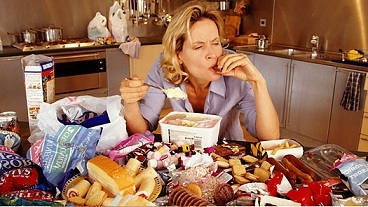|
Why do you eat? A question that seems like common sense, but actually encompasses significantly more. For most of us, if we ate based on our bodies’ needs and actual hunger alone we would be our ideal weight. However, we often eat for many reasons, beyond basic hunger and fueling our bodies. Sometimes there are social gatherings held over food and drink, other times we eat out of appetite or cravings for specific foods. A hot word buzzing around the web these days is emotional eating that affects a great deal of us without even realizing it. Emotional eating is eating in a way to feed our emotions, not our physiological needs. It often leads us to eat too much, to eat unhealthy foods, and can lead to a very unhealthy relationship with food. Not everyone is an ‘emotional eater,’ but many of us eat emotionally at some time. Without overcoming emotional eating, achieving and maintaining your long-term goals can be a struggle. So what really is the difference between emotional hunger and physical hunger anyways? Usually as we expend energy throughout the day, natural physical hunger comes on gradually and can be put off if you do not have access to food, whereas emotional hunger comes on very suddenly and feels like it needs to be satisfied immediately. When people experience physical hunger, they are open to eating whatever is available, open to options with lots of things sounding good and we stop eating when we are full. Conversely, when we feel like the hunger can only be satisfied by specific foods, craving comforting items there is an emotional link, leaving us feeling unsatisfied by just feeling full. The key difference between the two comes down to how we feel after we eat however, with emotional eating resulting in guilt, shame and powerlessness, feelings not felt if you are merely fueling physical hunger. Wondering whether you emotionally eat? Take time to honestly ask yourself the how often you do the following:
The truth is, if you emotionally eat you are not alone, especially during the cold months when the sunshine is hidden away and we are cooped up indoors. The main strategy to overcome this is to consciously realize what you are doing.  Take steps to address the emotional eating by practicing mindfulness. Start by identifying your triggers and raise awareness. Complete a diary for one week, noting emotions felt & situations prior to eating. Once complete, look through your week and identify triggers, such as emotions, time of day, social influences, places, habits, and so on. After you know the cause, find other ways to feed your feelings. This step is essential to overcoming emotional eating and achieving your lifelong goals. Here are some suggestions:
Pause when a craving hits. You want to be aware that you are feeling a craving, don’t push it off. Think about something that makes you feel powerful and proud, like how well your last workout went. Instead of telling yourself “I can’t give into my craving,” tell yourself “I can have X if I wait 5 minutes.” During this time, try to remove yourself from the food you are craving (leave the kitchen) and check in with yourself. How are you feeling? What’s going on emotionally? Even if you end up eating, you’ll have a better understanding of why you did it. Try doing one of the activities mentioned above. This can help you set yourself up for a different response next time. Accept your feelings, good or bad. Then after 5 minutes, ask yourself “will eating X really help?” and “do I still feel like I need X?” If you can, have a healthy snack instead of X, if you can’t have X and repeat this again the next time you are having a craving. The truth is, you are human. Cravings happen! We are constantly surrounded by stimulus that bring upon nostalgia and mixed emotions. The main thing is being honest with yourself and fueling your body with what it really needs. Alysha Coughler, MHSc, RD, Sports Dietitian, PTS Sports Dietitian and Personal Trainer for Evolved Sport and Nutiriton
2 Comments
24/9/2022 06:55:01 am
Emotional eating is a behavior that occurs when someone feels that they have a need to consume food or drink because they are experiencing an intense emotion. Emotional eating is a coping mechanism that can be used to cope with feelings such as sadness, loneliness, frustration, or boredom. It is important to realize that emotional eating is a coping mechanism and not a way to avoid the feeling. Eating food can help the person feel better, but it should not be used as a way to escape from emotions.
Reply
Leave a Reply. |
Categories
All
Archives
November 2021
|
- Home/ News
- About
- Services/ Store
- Media
-
Learning Center
- ESN Athletic and Healthy Lifestyle Learning Center >
-
Professional Learning Center
>
-
The ESN Sports Nutrition Certificate
>
- ESN Learning Center - Sports Nutrition Certificate Level 1 >
- ESN Learning Center Sports Nutrition Certificate Level 2 >
-
ESN Learning Center - Sports Nutrition Certificate Level 3
>
- Module 1 - Periodization for the Athlete
- Module 2 - Nutrition Strategies to Optimize Recovery
- Module 3 - Sports Nutrition for Children and Young Athletes
- Module 4 - Sports Nutrition for the Aging Athlete
- Module 5 - Nutritional Strategies for Injury Prevention and Concussions
- Module 6 - Nutritional Strategies for the Travelling Athlete
- Module 7 - Tournament Nutrition Strategies
-
The ESN Sports Nutrition Certificate
>
- Contact
Proudly powered by Weebly



 RSS Feed
RSS Feed